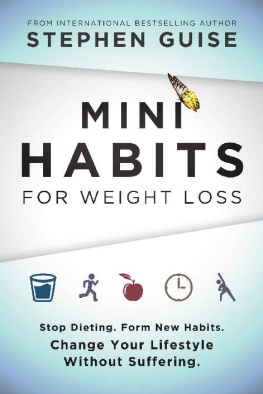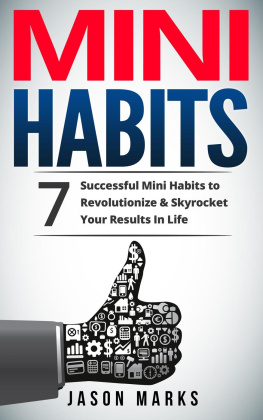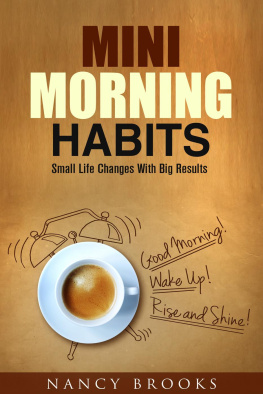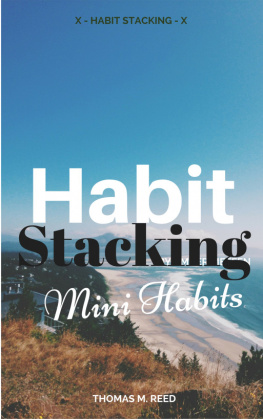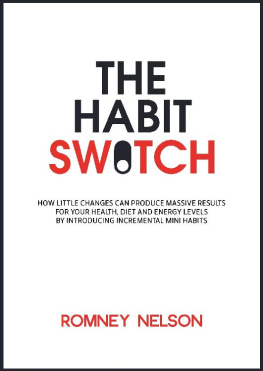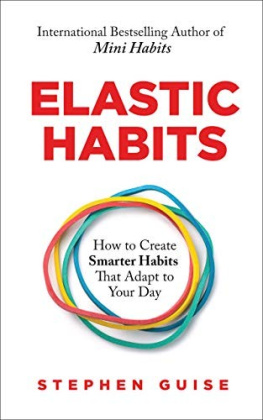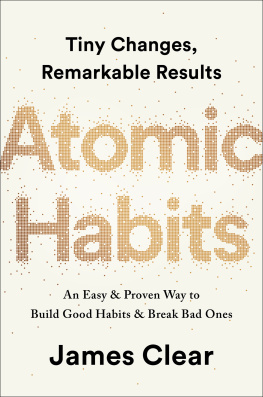Guise - Mini Habits: Smaller Habits, Bigger Results
Here you can read online Guise - Mini Habits: Smaller Habits, Bigger Results full text of the book (entire story) in english for free. Download pdf and epub, get meaning, cover and reviews about this ebook. year: 2013, genre: Romance novel. Description of the work, (preface) as well as reviews are available. Best literature library LitArk.com created for fans of good reading and offers a wide selection of genres:
Romance novel
Science fiction
Adventure
Detective
Science
History
Home and family
Prose
Art
Politics
Computer
Non-fiction
Religion
Business
Children
Humor
Choose a favorite category and find really read worthwhile books. Enjoy immersion in the world of imagination, feel the emotions of the characters or learn something new for yourself, make an fascinating discovery.

- Book:Mini Habits: Smaller Habits, Bigger Results
- Author:
- Genre:
- Year:2013
- Rating:4 / 5
- Favourites:Add to favourites
- Your mark:
- 80
- 1
- 2
- 3
- 4
- 5
Mini Habits: Smaller Habits, Bigger Results: summary, description and annotation
We offer to read an annotation, description, summary or preface (depends on what the author of the book "Mini Habits: Smaller Habits, Bigger Results" wrote himself). If you haven't found the necessary information about the book — write in the comments, we will try to find it.
Guise: author's other books
Who wrote Mini Habits: Smaller Habits, Bigger Results? Find out the surname, the name of the author of the book and a list of all author's works by series.
Mini Habits: Smaller Habits, Bigger Results — read online for free the complete book (whole text) full work
Below is the text of the book, divided by pages. System saving the place of the last page read, allows you to conveniently read the book "Mini Habits: Smaller Habits, Bigger Results" online for free, without having to search again every time where you left off. Put a bookmark, and you can go to the page where you finished reading at any time.
Font size:
Interval:
Bookmark:
Mini Habits
Smaller Habits, Bigger Results
by Stephen Guise
www.deepexistence.com
Primary blog focusing, habits, small steps, etc.
www.minihabits.com
Supplemental book information
Copyright and Disclaimers
Mini Habits by Stephen Guise
Copyright 2013, All Rights Reserved
Legal Disclaimer:
The information contained in this book is the opinion of the author and is based on the author's personal experiences and observations. The author does not assume any liability whatsoever for the use of or inability to use any or all information contained in this book, and accepts no responsibility for any loss or damages of any kind that may be incurred by the reader as a result of actions arising from the use of information found in this book. Use this information at your own risk.
The author reserves the right to make any changes he deems necessary to future versions of the publication to ensure its accuracy.
Preface
I had experimented with personal development strategies for a decade. When I accidentally started my first mini habit in 2012and the changes I made were actually lasting I realized the prior strategies I relied on were complete failures. When something works, that which doesnt work is exposed.
The science in this book exposes the most popular personal growth strategies as predictably inconsistent, and shows why mini habits are the most effective and reliable way to build healthy new habits.
When you finish reading Mini Habits , and then again after you start your first mini habit, youll wonder why nobody told you about this strategy before, and where it's been all your life. Well, hey, nobody told me either. But lets focus on your bright future, because this book will better equip you to change your life than 99% of the people you see walking around on this globepeople who think that they are the reason they cant achieve lasting change. But the truth is much less direthe problem isnt with them, its with their strategy.
How This Book Is Structured
There are seven major parts in Mini Habits . The end goal of this book is to help you permanently add healthy, habitual behaviors to your life. The first three parts discuss habit-building, the brain, willpower, motivation, and how they relate with one another. The next two parts discuss logical and scientific conclusions about how to best utilize this information. The last three parts show you how to apply it. Here are the seven parts in greater detail...
1. Introduction To Mini Habits
Here, you'll find out what a mini habit is. This part includes the story of how I first made one push-up a full workout (which became a mini-phenomenon called The One Push-up Challenge). We'll also explore why habits are so critical to actively develop.
What it establishes: what a mini habit is, the importance of habits, and how I stumbled upon my first mini habit.
2. How Your Brain Works
In part two, we're going to take a look at the human brain. Understanding the brain can help tremendously in new habit formation, because you can employ superior strategies with this knowledge. We'll learn about the active and passive (i.e. conscious and subconscious) parts of the brain, and how they work together to shape our daily behavior.
What it establishes: the inner workings of the human brain as it relates to behavior change and creating new habits.
3. Willpower Vs. Motivation
We have two strategies for taking actioneither get motivated so that we want to complete the task or force the issue by using willpower . Is one better than the other? Do we use both? Science reveals the winner, and suggests the single best way to apply it.
What it establishes: why it's best to use willpower exclusively (with mini habits) and ignore motivation altogether.
4. The Strategy of Mini Habits
The first three parts laid the foundation for this concept of tiny, daily actions; in the next two parts, well discuss why that is the case and how it should work. Mini habits are most effective with the proper mindset, and this part gets you into that mindset.
What it establishes: the connection between the Mini Habits strategy and everything we've learned about habit change to this point.
The Mini Habits Difference
This part delves into the advantages of the Mini Habits strategys differences and how it can work for you when others havent.
What it establishes: all that makes mini habits uniquely effective.
6. Mini Habits Eight Steps To Big Change
These eight steps will show you how to choose your habits, plan your journey, and take your first small steps forward. Each step is broken down into detail, explaining exactly why it's necessary, different strategies to employ, and how to best execute.
What it establishes: how to apply mini habits to your life, from the I want to create a new habit stage to success.
7. Eight Mini Habit Rules
This last part covers the eight rules of the Mini Habits strategy. These rules will keep you on track and ensure you maximize your potential and results.
What it establishes: the rules of mini habits that will help you get great results while avoiding habit-breaking mistakes.
***
Are you ready to discover how smaller habits lead to bigger results? I sure hope so, because I'm excited to show you. Let's go!
Part 1
Part 2
Part 3
Part 4
Part 5
Part 6
Part 7
The journey of a thousand miles begins with one step. Lao Tzu
Let's begin your first mini habit.
Read at least two pages of this book every day until you finish it. You may read more than that, but never less. It wont require much time or effort to read two pages, so there are no excuses. Now you can experience what it's like to have a mini habit as you read about mini habits.
Touch your nose right now. I'm serious. Ill explain later. Ok, now think about what the following truths mean for your life:
Big intentions are worthless if they don't bring results. For example, I can say that I will exercise for two hours every day, but if I never do it, the size of the intention doesn't matter. In fact, intention without action harms self-confidence.
People have been shown in studies to chronically overestimate their self-control ability.
These two simple points reveal why so many people struggle to change. They have big ambitions, but overestimate their ability to make themselves do what it takes to change. It's a mismatch between desire and ability.
Here are two more facts to consider:
Doing a little bit is infinitely bigger and better than doing nothing (mathematically and practically speaking).
Doing a little bit every day has a greater impact than doing a lot on one day. How much greater? Profoundly so, because a little bit every day is enough to grow into a lifelong foundational habit, and those are a big deal, as you'll see.
If these statements seem reasonable to you, the main conclusion to draw is that small intentions are better than big intentions. Interesting, right? We're just getting started.
Have you ever felt stuck? Have you ever tried to change yourself for the better and failed? Have you done it over and over again, and even stopped trying for long periods of time?
We've all been there, I think, but let me ask you these more interesting questions.
What if your failure to take action and stick to your plan was never a problem with you, but a problem with your strategy the strategy that most of the world uses and endorses? And what if the science about human behavior, willpower, and the brain suggested a better alternative for sticking to your plansone that is rarely practiced or promoted? And what if a shift to this new strategy changed everything for you, and no matter how you felt, you knew you could take action, reach your goals, form good habits, and change your life?
Font size:
Interval:
Bookmark:
Similar books «Mini Habits: Smaller Habits, Bigger Results»
Look at similar books to Mini Habits: Smaller Habits, Bigger Results. We have selected literature similar in name and meaning in the hope of providing readers with more options to find new, interesting, not yet read works.
Discussion, reviews of the book Mini Habits: Smaller Habits, Bigger Results and just readers' own opinions. Leave your comments, write what you think about the work, its meaning or the main characters. Specify what exactly you liked and what you didn't like, and why you think so.

